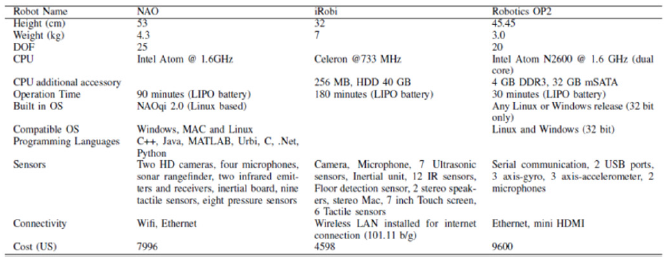Lupine Publishers| Journal of Robotics & Mechanical Engineering
Abstract
One of the prominent applications of robots is in assistive therapy using humanoids. Robots are now playing a vital role in our lives as assistants, therapist, companions and much more. Autism Spectrum Disorder (ASD) affects the communication skills and social cues of a person considerably. Recently efforts have been made in the development of communicational, behavioral, motor movements, joint attention and physical behavior of the children suffering from ASD using the humanoid robots. The therapies based on interactive interventions using robots for ASD have proved to be a favorable tool for improving the behavior of children with ASD. There are different ways to identify and improve the behavior in ASD child e.g. psychologists’ sessions, computer vision based bio markers like joint attention measurement and gait analysis, and robot assisted therapies using Autism Observation Scale for Infants (AOSI). In particular the area of robotics is helping a lot in the treatment of ASD as the robot acts as a mediator as well as measures the response of an autistic child.
Keywords: Autism; Joint Attention; Therapy; Bio Markers
Introduction
for the treatment of Autism spectrum disorder. The SAR aims at improving the social response and communication skills of an individual suffering with social disabilities. One of the most commonly addressed disabilities by the humanoid robots is Autism Spectrum Disorder (ASD) [1]. Impairment in social interactions and communication skills caused by a complex developmental brain disorder refers to the definition of Autism Spectrum Disorder [2]. Children under ASD lack verbal, non-verbal and communication skills such as joint attention, imitation, gait, motor skills, facial expressions etc. With the advancement in recent years, robots are now replacing human tasks with a lot of accuracy, reliability, different aesthetic and functional characteristics. Robots have now been interacting with ASD children under specially designed interactive interventions for improving the social cues and behavior of ASD child. There are several robots that have been made to develop social development skills or physical impairments. Research shows that robots helps to improve the attention span and develop the spontaneous skills of a child with ASD [3,4]. Examples of such robots are Paro [5-7], robotic doll Robot [8-11]. These robots help people with physical, emotional and behavioral disorders to improve their social interaction and cues.
Robots Utilized in ASD Interventions
There are multiple robots which have been developed and utilized in Autism Spectrum Disorder curing. Few of them are given in Table 1, which are listed along with their specifications. Among all, NAO is more famous and it’s being utilized in different applications along with Autism Spectrum Disorder.
Read More About Lupine Publishers Journal of Robotics & Mechanical Engineering Please Click on Below Link: https://robotics-engineering-lupine-journal.blogspot.com/


No comments:
Post a Comment
Note: only a member of this blog may post a comment.